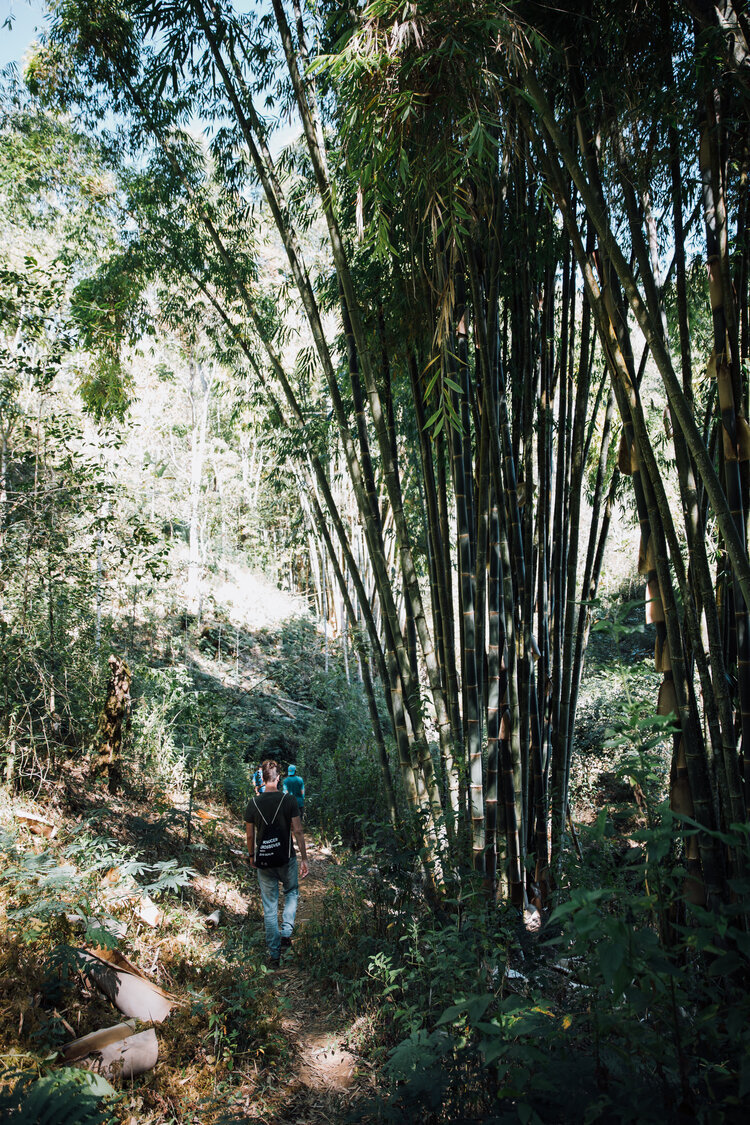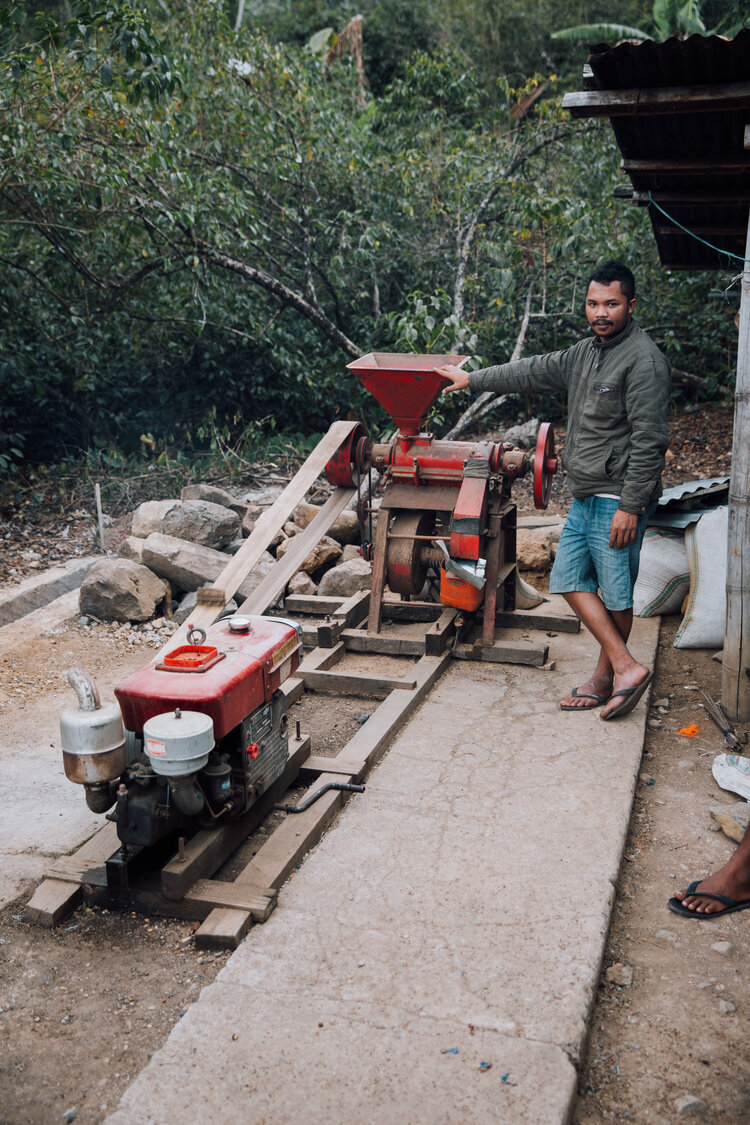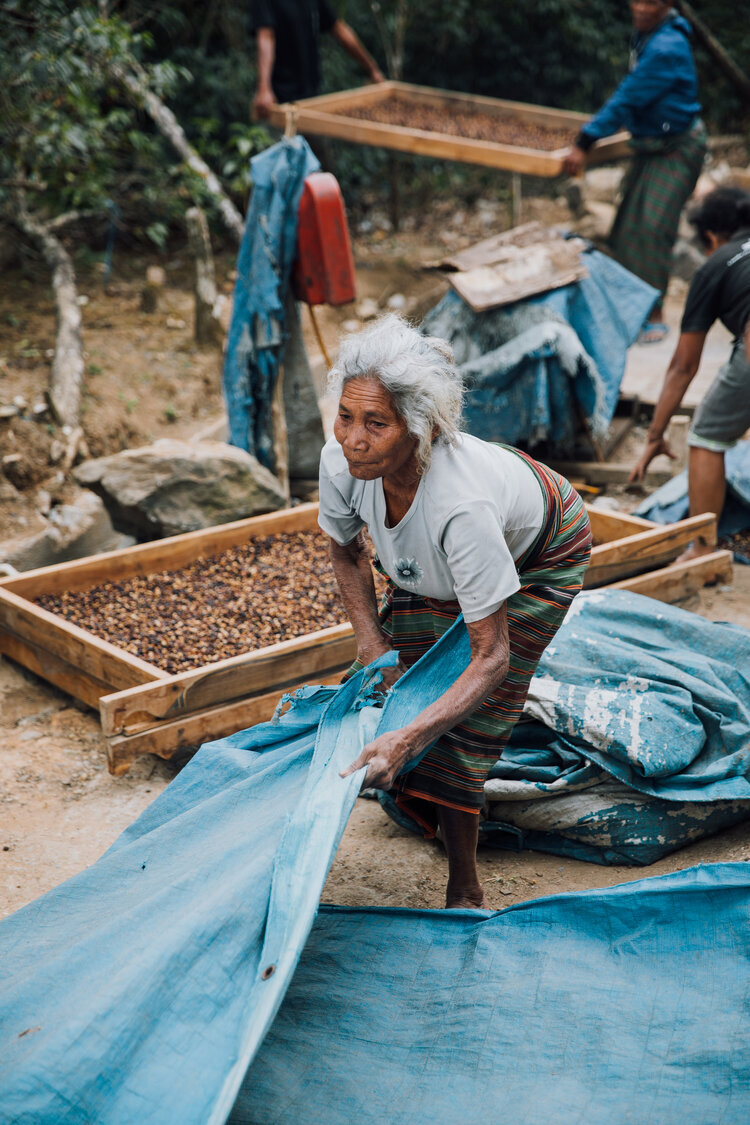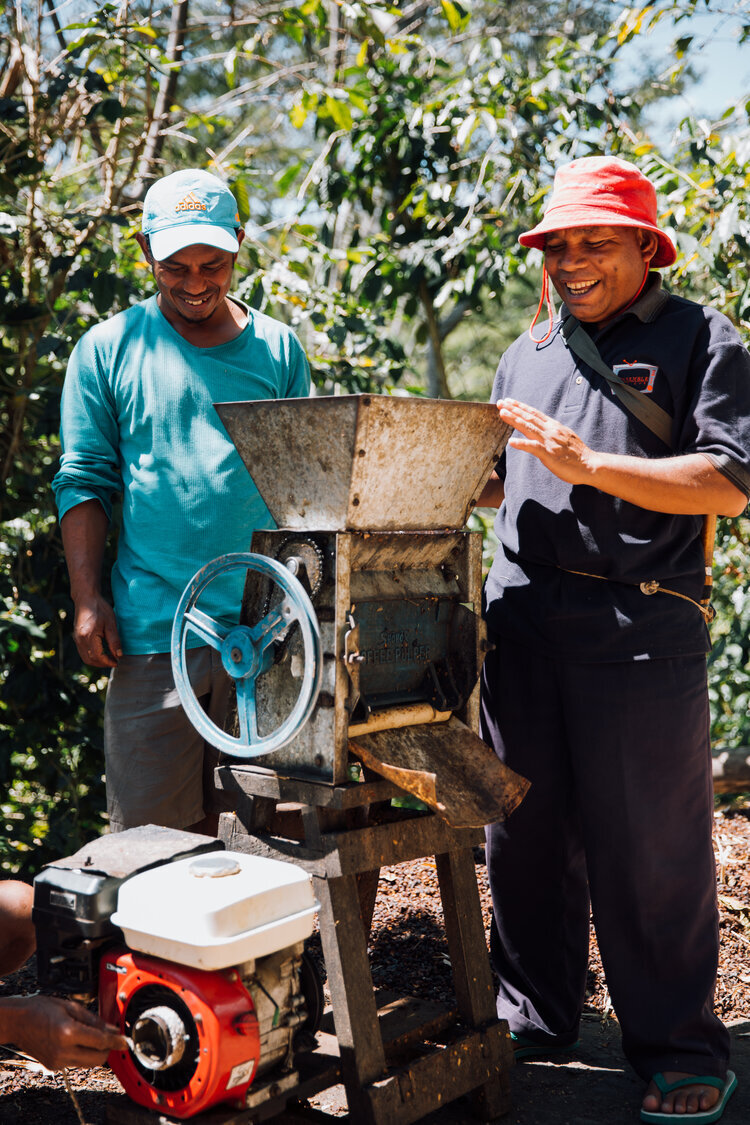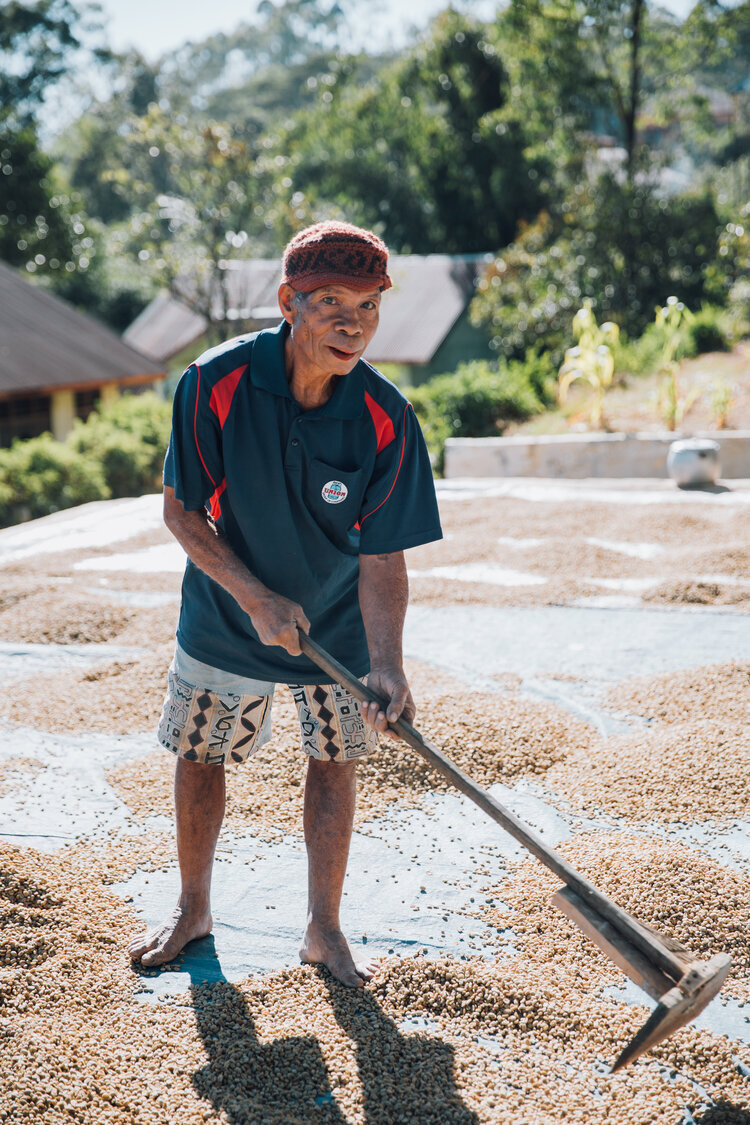personal coffee passport
Your coffee: traceability, flavor stability and producer impact
first half of 2023
Rwanda
FARMS: 400 smallholders delivering to Intango Washing Station
LOCATION: Karongi District - Western Province, Rwanda
CULTIVARS: Arabica Bourbon: French Mission, Jackson, Mbirizi
EXPORTER: Roots Origins Inc.
IMPORTER: This Side Up Coffees
ROASTER: Zwarts Coffee (Amsterdam Roasters)
OPERATOR: Selecta Netherlands
PERU
FARMS: Finca Churupampa SAC Cooperative, around 75 farms represented
LOCATION: Chirinos, San Ignácio - Cajamarca, Peru
CULTIVARS: Typica, Caturra and Pache
EXPORTER: Churupampa has own export license
IMPORTER: This Side Up Coffees
ROASTER: Zwarts Coffee (Amsterdam Roasters)
OPERATOR: Selecta Netherlands
Indonesia
FARMS: Assosiasi Petani Kopi Manggarai (ASNIKOM), representing around 50 farms
LOCATION: Rende Nao, East Manggarai (Flores)
CULTIVARS: Unique robusta varieties derived from uncontrolled cross-pollination
EXPORTER: Ontosoroh Coffee
IMPORTER: This Side Up Coffees
ROASTER: Zwarts Coffee (Amsterdam Roasters)
OPERATOR: Selecta Netherlands
second half of 2023
Rwanda
FARMS: 400 smallholders delivering to Intango Washing Station
LOCATION: Karongi District - Western Province, Rwanda
CULTIVARS: Arabica Bourbon: French Mission, Jackson, Mbirizi
EXPORTER: Roots Origins Inc.
IMPORTER: This Side Up Coffees
ROASTER: Zwarts Coffee (Amsterdam Roasters)
OPERATOR: Selecta Netherlands
Brazil
FARMS: Fazenda Fronteira, Fazenda California & Mulheres do Café Matão, totaling around 10 farms
LOCATION: Norte Pioneiro and Aguas Paulistas
CULTIVARS: Catuaí and Mundo Novo
EXPORTER: Capricornio Coffees
IMPORTER: This Side Up Coffees
ROASTER: Zwarts Coffee (Amsterdam Roasters)
OPERATOR: Selecta Netherlands
Indonesia
FARMS: Condiroto Farmer Group, totaling around 25 farms
LOCATION: Temanggung, Central Java, Indonesia
CULTIVARS: Unique robusta varieties derived from uncontrolled cross-pollination
EXPORTER: Ontosoroh Coffee
IMPORTER: This Side Up Coffees
ROASTER: Zwarts Coffee (Amsterdam Roasters)
OPERATOR: Selecta Netherlands
ABOUT THE PERUVIAN FARMS
Churupampa is not just a farm, it's a social business model which the Tocto family aims to expand, the last years to 30 neighbouring farms in their town of Chirinos. Some of the upgrades include better processing facilities, plant renovation schemes with the introduction of new varieties, new drying techniques with plastic covered raised beds to secure stable and uniform drying despite seasonal rainfalls. Every season, the quality control team cupped around 4,000 samples. Not one lot goes uncupped! This coffee is also Organic Certified.
About the Rwandese Station
Intango (pronounced “Inango”) is a small washing station on the edge of Lake Kivu. Once part of a cooperative that won the 2014 Rwanda Cup of Excellence, it became run down as the cooperative dissolved. That is until our friend Gilbert Gatali took it over. Grown up in Canada but Rwandan by roots, Gilbert came back to his African roots as a coffee importer. He then continued to help hundreds of farmers improve their quality as manager of Rwanda's first farmer-owned specialty coffee export company. Finally, after 13 years of managing coffee quality indirectly, he and his best friend Gervais are fulfilling their dreams of running their own specialty coffee washing station. The washing station works with only 400 supplying farmers, but this gives Gilbert the oversight to make lasting impact for all of them.
About the Indonesian farms
The regency of East Manggarai (also known as Flores) is one of the poorest regions of Indonesia. ASNIKOM is a locally owned cooperative and produces both arabica and robusta coffees. For its robustas, it has won several prizes and is renowned as one of the cleanest and nicest out in the world. They use the same standards and machinery for robusta as they do for arabica, leading to a spicy, very full bodied robusta that is pleasantly bitter because of its caffeine content, sweet chocolaty and very clean. It is a robusta that clearly can change the bad reputation this variety has.
About the Indonesian farms
On other side of the country, in Central Java, there is a farmer group that produces outstanding robusta, but has only been delivering to the world market at commodity prices. When Adri Yahdiyan from Ontosoroh Coffee got the taste their coffee, he convinced the farmers that there is a better paying and more stable market out there! Since 2022, they work together, with their first direct trade export to This Side Up. Through this partnership, there is a heightened interest in maintaining and improving quality even further.
About the brazilians
Capricornio coffees is located on the line of Capricorn (hence the name!) and therefore quite distant from the Equator, this means that winters are colder and average temperature is lower. The coffees will need to work harder to ripen, which increases the sweetness of the flavor, creating a very distinct coffee. This coffee is a blend especially prepared to achieve a composition of flavors full of fruit, vibrant complexity and a subtile body, and part of the Signature coffees line of the connected Capricornio farms. Signature coffees have taste profiles idealized and chosen by Capricornio Coffees directors José Antônio and Luiz Roberto, and validated by the Quality Control team. The aim is to create taste profiles that are repeated every year, offering not only quality, but also consistency, that coffee drinkers recognize every year.
The blend - coffee specs
what to taste for
Flavor Stability
At least four times per year, the blend gets extensively tested, tasted and redesigned to guarantee a similar flavor profile all year round, whilst supporting a variety of coffee producers.
Aroma: chocolate, dried berries, slight citric notes, spices.
Body: round mouthfeel with a thick body.
Acidity: hint of orange, grape.
Aftertaste: white pepper, almond, honey.
PROCESSING your coffee
The Peruvian coffee is washed and double fermented - using a hand pulper, coffees are pulped and fermented in tiled tanks for about 12-24 hrs depending on weather. They are then washed and fermented again for the same amount of time. The Rwandese coffee is a washed arabica coffee. The combination of altitude and processing results in a fresh, citric and fruity profile, with lots of sweetness and a hint of acidity. The Indonesian coffees are natural processed robustas, giving it a very round, sweet and spicy taste, without the hints of tar and rubber so often associated with this type of coffee. The Brazilian coffee is a pulped natural. The combination of altitude and processing results in a jammy, red fruit profile, with lots of sweetness and a dark chocolate backbone.
ROASTING YOUR COFFEE
Zwarts Coffee uses modern, highly energy efficient hot air roasters with an inbuilt afterburner, leading to lower CO2 emissions than conventional roasting. The machinery uses state of the art roasting software, controlled by a skilled roast master. The roast time is around 10 minutes. After the first crack, the coffee is roasted for a remainder of 25% of the time. All three the coffees are roasted separately, and mixed afterwards, to obtain the best flavor through the individual roast profiles and guaranteeing full traceability from bean to cup.
PRICE BREAKDOWN
€5.07 per kg
is what the farmers get (average of the three origins) for the green coffee price, stated as “FOB” or Free on Board. This is for growing, harvesting, milling and getting the bags onto the ship. Proof and exact price build-ups can be found below.
€1.48 per kg
importing costs. This is customs fees, insurance, warehousing charges, quality control, financing, and regular contact with the producers, all to be done by This Side Up Coffees.
€0.20 per kg
shipping from the Rotterdam warehouse to the Zwarts’ Coffee roastery in Amsterdam.
€1.38 per kg
roasting loss. When you roast green beans, around 15-20% of the mass evaporates. This means that 1kg of green coffee turns out to be 800grams of roasted coffee, which you need to “fill”.
€2.84 per kg
Remuneration for the roasting of the coffee. This means running the factory, roasting the coffees to their best quality, paying off the machinery, packaging the coffees and more. However, a total of €3.06 is needed to cover all costs. In order to guarantee the continuity for the farmers, a hit is taken for the 2023 contract in order to match the NZa price levels.
€10.97 per kg
Total price for which the coffees leave the roastery, to be handled by Selecta.
The contracts - proving the price
When you treat your partners as equal entrepreneurs and pay them accordingly, you’re proud of this relationship and you might as well show it all. Attached the buying contract for the three farms, which correspond to the prices allocated to the farmers + exporting partners in the three respective countries. A little legenda:
€1,00 is $1,00 (2022-2023 parity)
1 kg is 2,2 lbs (American pound)
To establish a good benchmark, we used the criteria put out by the advice of RVO, the Netherlands Enterprise Agency:
“During the entire term of the Agreement, the coffee producer shall at all times receive at least the applicable Fairtrade Minimum Price per pound minus 25% + the applicable Fair Trade Premium per pound + the applicable Organic premium per pound (Organic Differential) + the additional RWS premium per pound (towards a living income) of ad. $ 0.30.”
Taking this calculation, for the arabica coffees (Rwanda, Uganda and Ethiopia) we have a Fairtrade Minimum Price of $1.40/lbs, minus 25% + the applicable Fair Trade Premium ($0.20/lbs) + the applicable Organic premium per pound ($0.30/lbs) + the additional RWS premium ($0.30/lbs) = $1.85/lbs or €4.08/kg.
For the robusta coffee (Indonesia and India) the Fairtrade Minimum Price is $1.05/lbs, minus 25% + the applicable Fair Trade Premium ($0.20/lbs) + the applicable Organic premium per pound ($0.30/lbs) + the additional RWS premium ($0.30/lbs) = $1.59/lbs or €3.51/kg.
peru, finca churupampa (coop and exporter)
2021/2022 HARVEST
Paid price (in contract) of $2.40/lb for the farmers blend from Finca Churupampa. This amount is paid directly to the the cooperative, which has its own export license. Converting to kilograms, this is €4.56 per kg.
Rwanda, roots intango (washing station)
2022/2023 HARVEST
This year, due to shortages in the international coffee community but especially the central and East African region, prices went up considerable to $5.50/kg. Also this year, logistics costs are high and inflation in also the producing countries play a role. This equals a price of €5.26 per kg against the exchange rate of that moment.
Indonesia, ASNIKOM (coop) and Ontosoroh (exporter)
2022/2023 HARVEST
The ASNIKOM farmers got prefinanced by the Dutch NGO Progreso Foundation. Contract was made in euros, at €4.77/kg for the farmers. Here, there was an additional fee for Ontosoroh Coffee, to export the products, as is shown in the second contract, which is Rp7,200 per kg, which is €0.47 per kg. This brings the total to €5.25 per kg.
The Temanggung farmers received €3.81/kg and the Ontosoroh Coffee export costs and fee were €0.79 per kg. This brings the total to €4.60 per kg.
brazil, capricornio coffees (exporter)
2022/2023 HARVEST
Prices are represented in per bag price, respectively $317,65 per 60 kg. This equals a price of €5.07 per kg.
AVERAGING THE BLEND
Taking the second half of the year, the blend uses 40% Indonesian, 20% Rwandese and 20% Brazilian coffees. The price paid to the farmers come therefore stays solidly above the minimum reference price put forward by RVO at €4.92 per kilogram.
Notables about the individual origins
Next to having a traceable coffee of farmers that received the right price, it’s important to keep developing. We’re doing this with all three producer communities, and present a few notable facts.
PERU
Finca Churupampa and the Tocto Family in particular, are incredibly driven to work towards a full agroforestry system, where the production of coffee goes hand in hand with the workings of a tropical rainforest. It is one of the most ecological inspiring partners of the This Side Up portfolio.
The coffees of Finca Churupampa are all organic certified coffees.
RWANDA
Founder and CEO Gilbert, has a long track record in the international Specialty Coffee industry, with working experience in diverse high end North American firms. With this experience, quality and market demand connectivity are in good hands.
Only in 2019 the naturals were introduced, which now are amongst This Side Ups best performing and highest scoring coffees.
INDONESIA
The East Nusa Tenggara province, of which Flores consists, is identified by the UN as Indonesias most heavily affected by climate change the coming decades. Instead of waiting for it, we are swapping the weaker arabica for the more resilient robusta coffee variety.
Robusta has the stigma of being of low quality, low income for producers, and is often affiliated with instant coffee. We produce high quality robusta for a solid price, combined with a long term contract. As such, it is a climate adaptive coffee, ready for the future.
The province of East Nusa Tenggara is one of the poorest provinces of the country, and as such it makes sense to invest in the island of Flores, and focus on it catching up – on economic, social and environmental fronts.
ASNIKOM won a prize for producing extremely high quality coffees.
BRAZIL
The Signature blends might vary annually in composition, the farmers that deliver the coffees, do not. We proudly support two estates, being Fazenda California and Fazenda Fronteira, and two farmer groups, being the Women in Coffee and the farmers of São Jerônimo da Serra. Their individual stories can be read here.
Capricornio greatly reduces the ecological footprint of all their 20 partner farmers: they help them create water-efficient mills, implement waste water treatment technologies, and apply systems thinking to optimise all coffee processes and reduce CO2 output. They also stimulate the use of organic fertilisers, energy-efficient machinery and irrigation systems.
In 2022, Luiz, one of the owners of both Capricornio and Fazenda California, is elected as the first-ever farmer to become a board member in the prestigious world wide SCA (Specialty Coffee Association).
Copyright on pictures. Please consult This Side Up Coffees if one desires to use the pictures for commercial and non-commercial purposes.





























